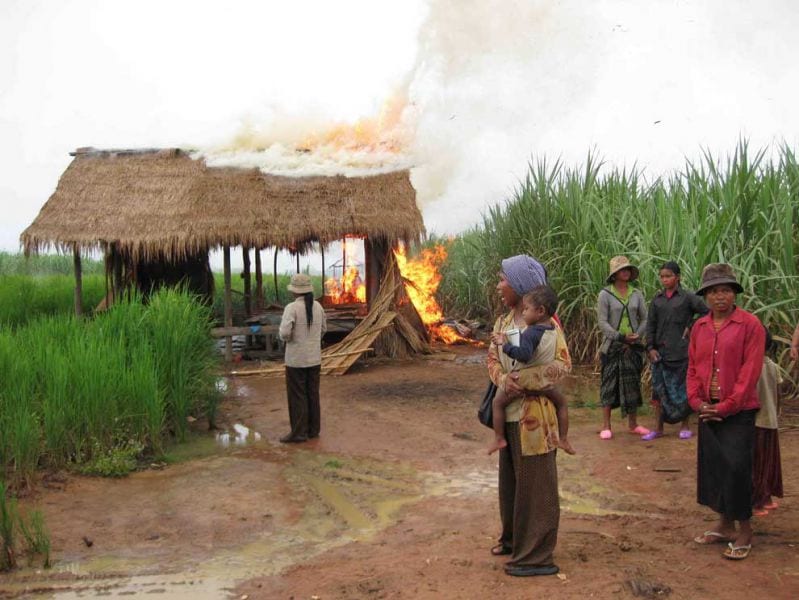Women watch their farm houses burn during forced eviction of Bos village (October 2009)
(Phnom Penh) – The UK-based “sustainable sugarcane” certification body Bonsucro violated its international human rights responsibilities, according to a statement released by the UK National Contact Point (UK NCP), a government body that handles complaints against British multinational enterprises. The NCP found that Bonsucro breached the OECD Guidelines for Multinational Enterprises when it admitted the Thai sugar giant Mitr Phol as a member after thousands of families were violently thrown off their land to make way for the company’s sugarcane plantations in Cambodia.
The statement was issued following an 18-month examination of a complaint brought on behalf of the affected families by Inclusive Development International, Equitable Cambodia and the Cambodian League for the Promotion and Defense of Human Rights (LICADHO).
“For years, Bonsucro has been providing cover for the sugar industry’s worst human rights offenders and the big brands that source from them,” said David Pred, Executive Director of Inclusive Development International.
The UK NCP found that Bonsucro “did not undertake an appropriate level of due diligence” when it readmitted Mitr Phol as a member in 2015. It also found that Bonsucro failed to use its leverage with Mitr Phol to remediate the harms suffered by Cambodian communities devastated by the company’s land grab.
Despite its continued refusal to provide compensation or other appropriate remedies to the families, Mitr Phol remains a Bonsucro member in good standing and continues to supply some of the world’s biggest brands, including Coca-Cola, Nestle and Mars Wrigley.
“If Bonsucro wants its ‘sustainable’ seal of approval to be considered credible in the eyes of consumers after this examination, it has only one choice, which is to terminate Mitr Phol’s membership immediately,” Pred added.
Multi-stakeholder initiatives like Bonsucro that claim to promote socially responsible and sustainable business practices, and that offer certification to companies that meet their qualifications, have become increasingly prominent as the public demands ethical sourcing in consumer goods. The UK NCP statement affirms that multi-stakeholder initiatives like Bonsucro are themselves subject to international human rights rules and will be held to account when they abuse the public trust and fail to demand that their members adhere to even the most basic standards of ethical conduct.
Mitr Phol’s human rights violations are well-documented. After securing legally dubious land concessions from the Cambodian government, Mitr Phol colluded with local authorities to grab 9,400 hectares of land from smallholder farmers for an industrial sugarcane plantation in northwestern Cambodia. Between 2008 and 2009, more than 2,000 families in 26 villages were forced to give up their land for the project. Affected households lost extensive rice fields, orchards, grazing land, crops and access to non-timber forest products that sustained their livelihoods. One residential village, O’Bat Moan, was completely destroyed. Police and private security forces descended on the village, forcibly evicting residents, bulldozing houses, torching rice fields, and beating and arresting villagers. The families were left homeless and landless, with many forced to migrate to Thailand to find work.
An investigation by the Thai National Human Rights Commission found Mitr Phol directly responsible for these human rights violations. But more than ten years later, the company has yet to take responsibility or make amends.
Representatives of the evicted families submitted a complaint against Mitr Phol to Bonsucro’s grievance mechanism in 2011. A year later, the Thai company withdrew from Bonsucro rather than address the complaint. In 2015, Bonsucro quietly reinstated Mitr Pohl without first requiring that it remediated the harms or restarting the complaint process. Inclusive Development International, Equitable Cambodia and LICADHO then filed a second complaint in 2016, which Bonsucro’s board dismissed in December 2018 on the grounds that it had not received “cogent evidence that…Mitr Phol breached the terms of Bonsucro’s Code of Conduct in place at the time.” In its decision, the UK NCP rejected Bonsucro’s argument that it should not be held accountable to OECD’s standards on responsible business conduct for its actions in this matter.
“Today’s decision is a vindication of our long struggle to hold Bonsucro accountable for enabling Mitr Phol’s abuses,” said Eang Vuthy, Executive Director of Equitable Cambodia. “But our work isn’t over, and we won’t stop until Mitr Phol is forced to compensate the people whose lives it destroyed.”
In another win for the Cambodian communities seeking justice against Mitr Phol, a U.S. federal court last week ordered the Coca-Cola Company to release findings from a prior investigation into its sugar supplier. The order came in response to a petition filed by Inclusive Development International on behalf of plaintiffs in a related class action litigation against Mitr Phol that is ongoing in Thai courts.
The final statement of the UK NCP is available at:
The complaint is available at:
For more information, see:
https://www.staging.inclusivedevelopment.net/cases/cambodia-mitr-phol-sugarcane-land-grab/


